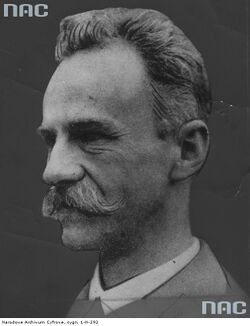
| Version | Summary | Created by | Modification | Content Size | Created at | Operation |
|---|---|---|---|---|---|---|
| 1 | Catherine Yang | -- | 876 | 2022-11-17 04:59:45 |
Video Upload Options
1. Introduction
Tadeusz Kotarbiński (Template:IPA-pol; 31 March 1886 – 3 October 1981) was a Polish philosopher, logician and ethicist.
A pupil of Kazimierz Twardowski, he was one of the most representative figures of the Lwów–Warsaw School, and a member of the Polish Academy of Learning (PAU) as well as the Polish Academy of Sciences (PAN). He developed philosophical theory called reism (Polish: reizm) and an ethical system called independent ethics. Kotarbiński also contributed significantly to the development of praxeology.
Henryk Greniewski and Kazimierz Pasenkiewicz were doctoral students under Kotarbiński.
2. Life
Tadeusz Kotarbiński was born on 31 March 1886 in Warsaw, then Congress Poland, Russian Empire, into an artist's family. His father, Miłosz Kotarbiński, was a painter his mother, Ewa Koskowska, was a pianist and composer. His uncles were Józef Kotarbiński, an important figure in Polish theater circles, and Wilhelm Kotarbiński, a talented painter. Expelled from secondary school in 1905 for participating in a strike, Kotarbiński managed to graduate two years later. He studied first as an unenrolled student at Jagiellonian University in Kraków, attending mostly lectures on mathematics and physics; then architecture in Lviv and Darmstadt, to finally settle for studies in philosophy and classical philology at the University of Lviv. His professors were some of the most esteemed philosophers, logicians and mathematicians of his time: Kazimierz Twardowski, Jan Łukasiewicz, Władysław Witwicki and philologist Stanisław Witkowski. He received his PhD with the thesis Utilitarianism in the Ethics of Mill and Spencer in 1912.
After graduation, he taught classical languages at Warsaw's Mikołaj Rey Gymnasium (secondary school). In 1918 he began a lecturing career in philosophy at Warsaw University; from 1929 to 1930 he was dean of humanities. After World War II, along with other eminent men of learning, he helped create a state university in Łódź. In 1945 Kotarbiński became the first rector of the University of Łódź, holding this post until 1949 while simultaneously working at the University of Warsaw. His model of work became a benchmark for future generations of scholars at the University of Łódź.
3. Philosophy
3.1. Reism
Reism is a pansomatism (from Greek: πᾶν 'all' + σῶμα 'body') ontology as well as semantic theory developed by Kotarbiński and most extensively exposed in his major work: Elements of the Theory of Knowledge, Formal Logic and Methodology of the Sciences, first published in 1929. Kotarbiński was the creator of the term reism, a word derived from Latin res 'thing'.
3.2. Ontological Reism
Kotarbiński's ontological reism approach assumes that the only things that exist, and thus the only ontological category to be used, are individual, concrete objects (or bodies) in opposition to doctrines allowing for the existence of such categories as universals, states of affairs, properties, relations, sets, classes, mental constructs etc.
3.3. Semantic Reism
In its sematic formulation Kotarbiński postulated that meaningful sentences have to contain so-called genuine names (referring to concrete objects) as opposed to abstract objects' names or non-genuine names (onomatoids). He also distinguished onomatoids from empty names, which he considered to be reistic. Sentences with onomatoids only were in his view meaningless, whereas those with empty names meaningful.
Reism has been anticipated by philosophers preceding Kotarbiński (Leibniz, Brentano and his pupils and earlier nominalists and materialists), but it was Kotarbiński who developed it to the complete, systematic exposition and gave it its name.
In 1958 in Philosophical Studies 4(7) Kotarbiński published Developmental Stages of Concretism, an essay in which he discussed the construction and evolution of his theory starting from the early concretism or nominalism, passing through seven stages of re-elaboration and finally culminating in pansomatism. Kotarbiński used terms: reism, pansomatism and concretism as equivalents to some extent throughout his works.
3.4. Praxeology
Kotarbiński was the most prominent representative and promoter of praxeology in Poland. Three years after publishing his major work on the subject: A Treatise on Good Work he persuaded Polish Academy of Sciences to establish a special unit called Workshop for Generic Work Organizational Issues (Pracownia Ogólnych Problemów Organizacji Pracy) later expanded into Department of Praxeology. Starting in 1962 it issued a periodical, initially called Materiały Prakseologiczne (Praxeological Papers), and then simply Prakseologia (Praxeology).
4. Works
- Szkice praktyczne (Practical Sketches, 1913)
- Elementy teorii poznania, logiki formalnej i metodologii nauk. Lvov Ossolineum (1929); second revised edition 1961
- Traktat o dobrej robocie (1955); English translation: Praxiology. An Introduction to the Science of Efficient Action, New York: Pergamon Press, 1965.
- Sprawność i błąd (Efficiency and Error, 1956)
- Fazy rozwojowe konkretyzmu (= Studia Filozoficzne 4.7, 1958)
- Medytacje o życiu godziwym (Meditations about Decent Life, 1966)
- Leçons sur l'histoire de la logique. Paris: Presses Universitaires de France 1964. Original Polish edition 1957.
- Gnosiology. The Scientific Approach to the Theory of Knowledge. Oxford: Pergamon Press 1966 (English translation of Elementy by O. Wojtasiewicz).
- Ecrits sur l'éthique (1935–1987), Hermann, Paris, 2017.

Location: Warsaw, Congress Poland, Russian Empire




